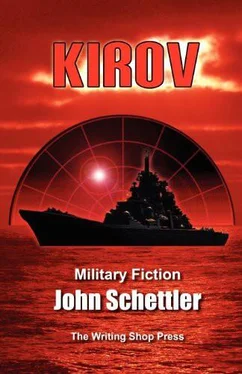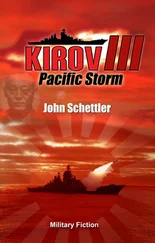John Schettler - Kirov
Здесь есть возможность читать онлайн «John Schettler - Kirov» весь текст электронной книги совершенно бесплатно (целиком полную версию без сокращений). В некоторых случаях можно слушать аудио, скачать через торрент в формате fb2 и присутствует краткое содержание. Жанр: Фантастика и фэнтези, Альтернативная история, на английском языке. Описание произведения, (предисловие) а так же отзывы посетителей доступны на портале библиотеки ЛибКат.
- Название:Kirov
- Автор:
- Жанр:
- Год:неизвестен
- ISBN:нет данных
- Рейтинг книги:5 / 5. Голосов: 1
-
Избранное:Добавить в избранное
- Отзывы:
-
Ваша оценка:
- 100
- 1
- 2
- 3
- 4
- 5
Kirov: краткое содержание, описание и аннотация
Предлагаем к чтению аннотацию, описание, краткое содержание или предисловие (зависит от того, что написал сам автор книги «Kirov»). Если вы не нашли необходимую информацию о книге — напишите в комментариях, мы постараемся отыскать её.
Kirov — читать онлайн бесплатно полную книгу (весь текст) целиком
Ниже представлен текст книги, разбитый по страницам. Система сохранения места последней прочитанной страницы, позволяет с удобством читать онлайн бесплатно книгу «Kirov», без необходимости каждый раз заново искать на чём Вы остановились. Поставьте закладку, и сможете в любой момент перейти на страницу, на которой закончили чтение.
Интервал:
Закладка:
“Yes, there was a dog,” said Orlov. “A rather of obnoxious dog as well. Barked its fool head off.”
“You have further information concerning this man, Fedorov?”
“Yes, sir. His identity card states his date of birth as 18 June 1894. He was an officer in the Norwegian Navy, receiving the war cross with sword for his efforts in maintaining these Arctic weather stations, a very high distinction. He oversaw operations on this island as well as Svalbard.”
“Born in June of 1894?” said Karpov. “The man would be 127 years old! This is clearly impossible.”
“If I may, sir,” said Fedorov, “in 1941 he would be just 47 years old, about the age of the man we saw at the site, the very same man Sergeant Troyak took this identity card from.”
“Perhaps it was his father's, then,” said Karpov sourly.
“Considering the other evidence, that seems unlikely, sir. The man also had this notebook, in which he has been making meteorological notations on a daily basis.” He passed the notebook to Karpov. “You will note the date of the most recent entry, July 28, 1941. And sir, I also found this.” He pushed the newspaper he had found in the dugout across the briefing table, and Karpov glanced at it briefly, being more interested in the notebook for the time being.
“Now that is an old newspaper, to be sure,” said Fedorov. “It dates back to March of 1941, so I can only assume these men brought it with them when they landed at that time, as the history clearly indicates. But if it were authentic it would be far more weathered than it is now, yes?”
There was silence around the table until Volsky spoke. “We must also reconsider the evidence we obtained on the surface contact Rodenko has been tracking. The video feed showed ships that Mister Fedorov here has identified as WWII class vessels. We suspected this feed may have been tampered with, but seen in this light, the whole situation begins to paint a rather convincing picture, even if it must seem impossible to us all.” The Admiral stared at them, his dark eyes fixed and steady. “Gentlemen, it appears that we are not where we belong. Appearances can be deceiving, but all the evidence indicates the present year is 1941. This means that somehow, possibly as a result of that strange undersea explosion, we have shifted seventy years into the past!”
His expression was one of clear amazement. “Believe me, I have given consideration to every other possible explanation, but the evidence of our own eyes speaks volumes. We cannot contact Severomorsk on our normal coded radio channels because they did not exist in 1941. We hear nothing but old signals broadcasting WWII documentaries on the shortwave, no matter what station we tune in. We have images of obsolete ships on video, and were overflown by a plane that exists only in a museum just hours ago. And now all this…” he gestured broadly at the accumulation of evidence on the table.
“Yet if this is a psychological operation perpetrated by NATO this is exactly what they would want us to believe,” argued Karpov.
“Doctor?” The Admiral had invited the ship’s physician to the meeting as well. “Are we all losing our minds here or do we have good reason to reach these conclusions, as preposterous as they may seem.”
“Well… I am finding it difficult to assume NATO has removed all these vital installations and facilities simply for the sake of playing a psychological game on us here. Who would have dreamt up such a thing-to try and convince the flagship of the Northern Fleet that she has moved in time? The whole idea is absurd. Do you think they staged all of this, the ships, the plane, the island, just for theater? Consider the cost and requirements of such an endeavor, and could they do such a thing right here in our own back yard, as it were, without us knowing about it? Hundreds of people rely on the daily weather data transmitted from the Met station on Jan Mayen. Yet we hear nothing now. Where are the facilities that should be on the island? Fifteen or twenty buildings do not simply vanish overnight. And you cannot obliterate an airfield. If it were there, and attacked as Orlov suggests, then you would have seen obvious signs.”
“That is no more preposterous than the notion that this ship has suddenly become a time machine and the year is actually 1941,” said Karpov.
“Perhaps,” said the doctor, “but do you have another explanation that fits with all the other things we have noted?”
Karpov steamed. “You ask me to choose between two nonsensical alternatives,” he said brusquely.
“Yet that is exactly what we must do here,” said Zolkin. “We must decide and choose, and then act accordingly. If we are in our own time, then our actions will soon bear that out. We can simply turn about and steam for Severomorsk, and that will settle the matter once and for all. Before that we should consider the situation carefully. Because if, by any stretch of the imagination, all these facts do add up to the improbable conclusion that we have somehow shifted in time, then realize what this means.” He looked at them all now, casting a knowing glance at the Admiral as well. “It means that we would be sitting in the most formidable ship in the world, with full knowledge of the history that is about to unfold, and the power to change it…”
The doctor had the undivided attention of every man present. Even Karpov seemed to settle into some deep inner thought, ruminating and planning. His eyes betrayed the operation of his mind as he considered the incredible advantage of the position he might now find himself in, no matter how much his every instinct screamed that this whole premise was patently ridiculous.
“The reactors,” said the Admiral in a low voice. “Chief Dobrynin said the reactors sounded odd when we experienced those strange effects in the sea. He had unusual readings and requested we reduce speed. I wonder…” He had not yet formulated a complete thought here, and so he put the matter aside, the other evidence appearing to be conclusive in his mind, however preposterous it seemed.
With the weight of both the Admiral’s considered opinion and that of the ship’s physician, both well liked and respected men, the others present voiced no objections, waiting in silence. Even Orlov, practical and gritty in every respect, a man who would normally be delivering a stream of invectives at such nonsensical ideas, sat dumb.
“Mister Fedorov,” said the Admiral. “For those of us not so well schooled in the history of the Great Patriotic War, can you tell us anything about what would be happening at this time if it were indeed late July of 1941?”
“Well sir, at this time Great Britain’s lone stand against Nazi Germany has been broken by the German invasion of the Soviet Union some months ago. And as we heard in some of the radio broadcasts we have intercepted, German panzers have reached Smolensk and will be fighting an encirclement operation there for the next month. They will then turn south to take Kiev before pressing on to threaten Moscow in what will be called Operation Typhoon in October. The Germans are also tightening the noose around Leningrad, as St. Petersburg was called then, and the siege there will begin in early September of this year.
“Remember that the United States has not yet entered the war, and will not do so for five months until the Japanese attack at Pearl Harbor in December. There is, however, increasing cooperation between Great Britain and the United States, particularly over the conduct of operations in the Atlantic. The United States landed the 1st Marine Brigade at Reykjavik and officially began relieving the British garrison there the first week of July, 1941. They have already transferred fifty destroyers to Great Britain to assist their defense of the convoy routes, and the Lend Lease law will have narrowly passed the American Congress allowing the Allied powers to ship supplies and material directly to the Soviet Union in the Murmansk convoys. The first of these, Convoy Dervish, would be very close to setting out for Murmansk. It was a small, and rather insignificant convoy, just six ships carrying raw materials and fifteen crated hurricane fighter planes. It was meant to demonstrate the feasibility of organizing Arctic convoys to the Kola Peninsula area in the future.”
Читать дальшеИнтервал:
Закладка:
Похожие книги на «Kirov»
Представляем Вашему вниманию похожие книги на «Kirov» списком для выбора. Мы отобрали схожую по названию и смыслу литературу в надежде предоставить читателям больше вариантов отыскать новые, интересные, ещё непрочитанные произведения.
Обсуждение, отзывы о книге «Kirov» и просто собственные мнения читателей. Оставьте ваши комментарии, напишите, что Вы думаете о произведении, его смысле или главных героях. Укажите что конкретно понравилось, а что нет, и почему Вы так считаете.












